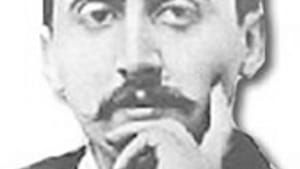Stay in the Loop
BSR publishes on a weekly schedule, with an email newsletter every Wednesday and Thursday morning. There’s no paywall, and subscribing is always free.
"How To Talk About Books'

The only book you'll ever need
LEONARD BOASBERG
I dream of one day being a guest at a dinner party where an erudite scholar is holding forth on the glories of Marcel Proust’s Remembrance of Things Past. He expounds on the exquisite style and sensitivity of the famous French author. He notes Proust’s taste in fashion, his precise descriptions of Combray, his love for Mme. de Guermantes. He quotes from memory Proust’s penetrating observation that “The facts of life do not penetrate to the sphere in which our beliefs are cherished; as it was not they that engendered those beliefs, so they are powerless to destroy them.”
I observe the embarrassment of the other guests who, like me, never finished or even began the celebrated novel. And, as the speaker pauses after mentioning Cities on the Plain, I break in:
“Oh, you read A la recherche du temps perdu in English?”
So you can imagine my delight in discovering the just-published How to Talk About Books You Haven’t Read, by a French professor and psychoanalyst named Pierre Bayard.
A best-seller in France, Comment parler is a must-know-about, a tour de force, a brilliantly conceived work blending the insights of social psychology with those of social intercourse. It is a primer on how to impress one’s professors, one’s students, one’s friends (and one’s enemies) with the least effort and maximum results when chatting about books.
M. Bayard provides pointers on how to discuss— or, rather, fake— discussion of classics, current literature and trash that you may never even have heard of.
You can, for example, if you know anything about the book, begin talking about another book on a related subject, or another book that the author wrote, or a book that you yourself wrote, or thought of writing. You can do what many reviewers do, which is to skim, or read the introduction and last chapter. You can just check out the index.
If you happen to be talking to the author, you can always resort to such comments as “You’ve never done better” or “You’ve really done it this time.” You can steer the subject to the author—authors love to talk about themselves.
There is, after all, M. Bayard points out, only a difference of degree between a book perused and a book of which one has heard.
M. Bayard says he has never even opened James Joyce’s Ulysses, but that hasn’t kept him from expressing an opinion about it.
How to Talk About Books You Haven’t Read should be on every book-lover’s shelf. Oscar Wilde said he never read a book he had to critique. As for me, I have asked Borders to reserve a copy for me. And I intend to read it some day, when I have the time.
To read a response, click here.
LEONARD BOASBERG
I dream of one day being a guest at a dinner party where an erudite scholar is holding forth on the glories of Marcel Proust’s Remembrance of Things Past. He expounds on the exquisite style and sensitivity of the famous French author. He notes Proust’s taste in fashion, his precise descriptions of Combray, his love for Mme. de Guermantes. He quotes from memory Proust’s penetrating observation that “The facts of life do not penetrate to the sphere in which our beliefs are cherished; as it was not they that engendered those beliefs, so they are powerless to destroy them.”
I observe the embarrassment of the other guests who, like me, never finished or even began the celebrated novel. And, as the speaker pauses after mentioning Cities on the Plain, I break in:
“Oh, you read A la recherche du temps perdu in English?”
So you can imagine my delight in discovering the just-published How to Talk About Books You Haven’t Read, by a French professor and psychoanalyst named Pierre Bayard.
A best-seller in France, Comment parler is a must-know-about, a tour de force, a brilliantly conceived work blending the insights of social psychology with those of social intercourse. It is a primer on how to impress one’s professors, one’s students, one’s friends (and one’s enemies) with the least effort and maximum results when chatting about books.
M. Bayard provides pointers on how to discuss— or, rather, fake— discussion of classics, current literature and trash that you may never even have heard of.
You can, for example, if you know anything about the book, begin talking about another book on a related subject, or another book that the author wrote, or a book that you yourself wrote, or thought of writing. You can do what many reviewers do, which is to skim, or read the introduction and last chapter. You can just check out the index.
If you happen to be talking to the author, you can always resort to such comments as “You’ve never done better” or “You’ve really done it this time.” You can steer the subject to the author—authors love to talk about themselves.
There is, after all, M. Bayard points out, only a difference of degree between a book perused and a book of which one has heard.
M. Bayard says he has never even opened James Joyce’s Ulysses, but that hasn’t kept him from expressing an opinion about it.
How to Talk About Books You Haven’t Read should be on every book-lover’s shelf. Oscar Wilde said he never read a book he had to critique. As for me, I have asked Borders to reserve a copy for me. And I intend to read it some day, when I have the time.
To read a response, click here.
Sign up for our newsletter
All of the week's new articles, all in one place. Sign up for the free weekly BSR newsletters, and don't miss a conversation.
